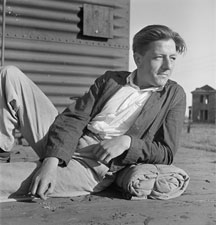Time of Your Life
Overview of the 1930's
Photographs & Images 1930-1940 (long load time)
Saroyan:
Construction of San Francisco Bridges (thumbnails)
San Francisco and the General Strike
Let the Lower Lights be Burning—Philip Bliss
Louis L'Amour
Director / Dramaturg interview (Steppenwolf, June 2002)

Murals (thumbnails)
The Art of Bartending & Drinking
A Bizillion Links



















Brief Time Line 1938-1939
1938
Thomas Jefferson's portrait was placed on the U.S. 5¢ coin.
Albert Einstein and Leopold Infeld published The Evolution Of Physics.
A federal minimum wage of 25¢ per hour was established.
Howard Hughes flew around the world in 91 hours.
Douglas Corrigan was dubbed "Wrong Way Corrigan" for flying from New York to Ireland after claiming he was headed for California. It was later discovered that Corrigan was intentionally flying across the Atlantic, but did not have a permit nor passport.
460 died when a hurricane tore through New York, Connecticut, Rhode Island and Massachusetts.
200 perished in mud slides in southern California.
Pearl S. Buck won the Pulitzer Prize for literature for The Good Earth.
Relations with Nazi Germany became tense when word reached the oval office that Jews were being persecuted.
The introduction of the self-propelled combine would help revolutionize the farm industry.
Widespread panic and a handful of suicides took place when CBS broadcast Orson Welles' production of War Of The Worlds. The broadcast was staged as a music program interrupted by bulletins about a Martian invasion and takeover of the Earth.
Popular songs included Chiquita Banana, You Must Have Been A Beautiful Baby, and My Heart Belongs To Daddy.
1939
England and France declared war on Germany. The Germans invaded Poland. The Russians - who had signed a non-hostility pact with Germany - invaded Finland.
President Roosevelt and congress convened to discuss measures for the U.S. to stay neutral.
Despite the impending war in Europe, World Fairs in San Francisco and New York had upbeat themes, giving visitors glimpses of new inventions that would have impacts in the future, such as touch-tone telephone dialing and television.
Nylon stockings were introduced.
The first transatlantic passenger plane service began between Long Island and Lisbon.
Edwin Armstrong conducted preliminary tests of a new type of audio radio signal called Frequency Modulation, or FM.
Continuing daytime dramas became popular on radio. They were called "soap operas" because of the placement of sponsor's commercials within the storylines.
This website last updated, 1/17/04. © hcoleman 2002